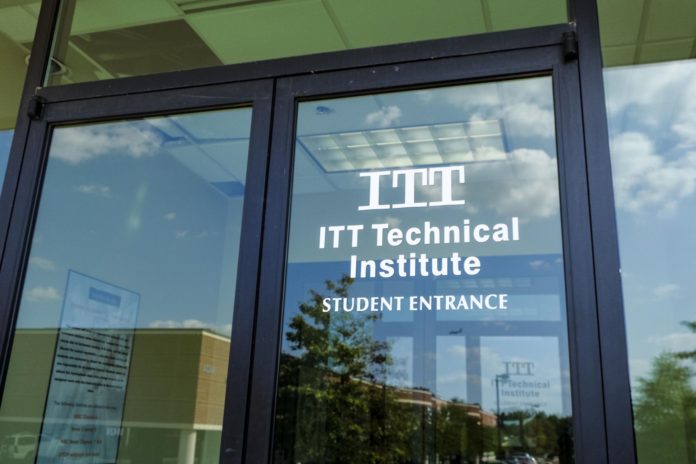The abrupt closure of ITT Technical Institutes on Tuesday left 35,000 students without degrees that many took on debt to complete. None of the options available to those students are simple and each comes with its own set of drawbacks.
The Department of Education has set up a website, studentaid.gov/ITT, and has a series of webinars in the works to make students aware of their rights. Here are a few things the department and advocacy groups say ITT students should consider before deciding what to do next:
Transferring Credits: When education officials curtailed ITT’s access to federal loans and grants in August, they required the company to develop agreements with other colleges to ensure students could complete their education in the event of a shutdown. Now that ITT Tech has closed its doors, the department is asking community colleges near ITT locations to accept academic credits from the career school.
ITT has struck agreements with a number of trade schools and career colleges across the country to make it easier for students to transfer their credits. You can find a list of schools in every state at www.itt-tech.edu/articulation. Some of the schools listed are for-profit colleges that are battling government sanctions, such as Ashford University, which recently paid the department a fine for financial aid violations. Other options on the list include vocational high schools.
“The colleges most likely to grant credit are, unfortunately, the ones most likely to have low standards and therefore not be a good option for the students,” said Robert Shireman, a senior fellow at the Century Foundation and a former undersecretary of education.
There also is a financial downside to transferring credits into a comparable program at another school. Transferring credits to complete the same degree at another institution will make current ITT students ineligible for federal student loan forgiveness under what’s known as a closed-school discharge. That discharge is the easiest way for students to have the loans provided by the government canceled, but it’s not the only discharge option (more on that later).
Closed-School Discharge: Anyone enrolled at ITT up until Tuesday or who withdrew from the school in the past 120 days is legally entitled to have their federal student loans forgiven under a closed-school discharge. In order to qualify for this form of debt relief, students who want to continue their education must start all over again.
Someone studying nursing, for example, would be ineligible if they were to transfer ITT credits into a nursing program at another school. But if that student transferred out of ITT into a similar program that he fails to complete, the closed-school option would still be on the table, said Debbie Cochrane, vice president at the Institute for College Access and Success.
“The most important thing is for students to consider their options very carefully,” Cochrane said. “There’s a variety of legal service providers who can help students weigh the pros and cons of various options. And the Department of Education has its website and is working to make sure loan servicers have the best information for students.”
A key benefit of the closed-school option — aside from the debt cancellation — is that the discharge also will be reported to credit bureaus, which must delete any adverse credit history tied to the loan. Students also will be reimbursed any money paid out of pocket or through forced debt collection, according to the Education Department.
“The best solution for students who are eligible is to take the closed-school discharge,” said Alexis Goldstein, senior policy analyst at Americans for Financial Reform. “ITT’s programs were over-priced for what students got in return, and many schools will not take the credits they earned at ITT anyway.”
Borrower Defense to Repayment: As mentioned before, the closed-school option is not the only way students can get their federal loans canceled. Students can apply to have their federal loans discharged if they can prove a school used illegal or deceptive tactics in violation of state law to persuade them to borrow money for college, a process known as a “borrower defense to repayment.” This option would give students who choose to transfer their ITT credits a path to loan forgiveness, but not an easy path.
Though the Obama administration has proposed an overhaul of the process, the existing system is widely considered difficult to navigate. It was rarely used until the 2014 collapse of for-profit chain Corinthian Colleges ushered in a deluge of claims at the department, forcing the agency to take steps to fix the system and create a new standard to judge appeals for debt relief.
As of June, the department already had received more than 350 claims from ITT students. None of the requests for loan cancellation have been granted to date.
“A limited number of claims have been granted and they’ve all been for students who attended Corinthian Colleges,” Cochrane said. “One would hope the department will look at some of the findings around ITT to see whether an expedited process might be warranted.”
ITT students in a number of states, including New Mexico and Massachusetts, may have a strong case to have their defense claims approved. Massachusetts Attorney General Maura Healey filed a lawsuit against ITT in April for allegedly engaging in abusive sales tactics and misleading students about the quality of its programs. Those fraud charges could be used as the basis for a claim.
And a warning: Applying for any form of loan forgiveness is free. Education Secretary John B. King Jr. is imploring ITT students to steer clear of any company offering help in exchange for money.









